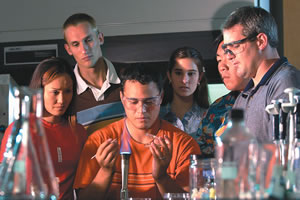Educational Challenges

|
By Steven C. Wheelwright
President Brigham Young University Hawaii
I am fortunate to be president of an institution of higher learning that embraces both spiritual as well as secular learning. At Brigham Young University Hawaii, we believe in the “whole person” educational experience: that both spiritual as well as intellectual learning benefit mankind. We want to prepare young men and young women to be leaders in their homes, their communities and their professions, and we believe that requires educating for a lifetime of learning on multiple dimensions.
Over the past 25 years, my academic efforts along with those of several close Harvard colleagues have focused on the world of innovation and discovery. I have come to see three main challenges of higher education through the lens of innovation and product development.
The first of these challenges follows directly from the ever-expanding knowledge base in all the fields and disciplines with which we are concerned. Much of this is the result of the inspired and inspiring efforts of the researchers located within universities around the globe.
Almost daily we hear of the discovery and refinement of new and exciting knowledge, which deepens our understanding of the physical and social sciences and expands the horizons of artistic endeavor. But with this progress comes greater and greater specialization within the disciplines, and the challenge of keeping up-to-date both individually and collectively. How do we continually refine and improve our undergraduate curriculum so that our students are prepared for the world of tomorrow?
A second challenge is that of the marketplace for our graduates - the organizations and businesses whose very existence depends on hiring graduates who are prepared to participate in practice, who can add to the effectiveness of their organization from day one, and who can continue to build on a solid educational foundation through constant, ongoing learning.
While these two challenges have major implications for departments and their faculties, they also have major implications for both general education courses as well as for upper-division work in a major. Part of the challenge arises because the dominant organization in universities is functional, yet the market wants graduates who can bring integrated knowledge to bear on a diverse set of conditions and provide solutions to complex problems. The core strength of the university - deep functional expertise in multiple disciplines - appears to work against the integration that potential employers seek.
And let me just mention a third challenge that undergraduate programs are wrestling with: the question of pedagogy and how to make teaching and learning more engaging and relevant to students. Through a variety of new technologies and innovations, the world is discovering new ways of communicating, learning and working together. Fast disappearing is the day of the traditional education model of a learned professor lecturing to a class with the dominant information flow being one way.
We are seeking answers to the challenges. I firmly believe that much of what has been learned in recent decades regarding innovation and the development of new products and services may be useful. I also believe that we can receive inspiration and insights to go along with our dedicated intellectual work as we more fully engage our students and those who will hire them.
We can be both excellent and distinctive in doing this work. In fact, given our scale and resources, I believe the only way we can accomplish this is by integrating the best of secular learning with the best of spiritual learning and insight. That’s a major reason why I’m here in Laie. Through effective organization and innovative efforts on the part of both faculty and staff, I believe we can significantly raise the quality of the educational experience we provide while lowering the cost per student.
These challenges make it a particularly exciting time to be a part of Brigham Young University Hawaii.
E-mail this story | Print this page | Comments (0) | Archive | RSS Comments (0) |
Most Recent Comment(s):




 Del.icio.us
Del.icio.us








